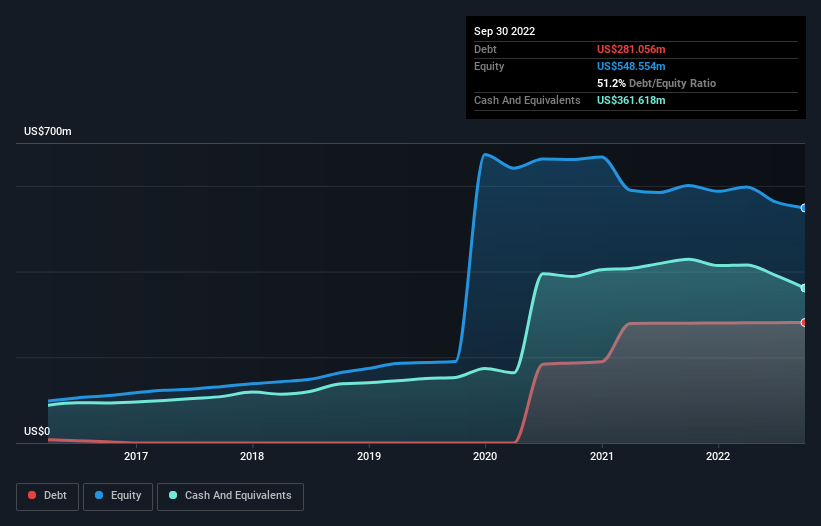- United States
- /
- Medical Equipment
- /
- NYSE:GKOS
Health Check: How Prudently Does Glaukos (NYSE:GKOS) Use Debt?

Legendary fund manager Li Lu (who Charlie Munger backed) once said, 'The biggest investment risk is not the volatility of prices, but whether you will suffer a permanent loss of capital.' So it seems the smart money knows that debt - which is usually involved in bankruptcies - is a very important factor, when you assess how risky a company is. As with many other companies Glaukos Corporation (NYSE:GKOS) makes use of debt. But the real question is whether this debt is making the company risky.
What Risk Does Debt Bring?
Debt is a tool to help businesses grow, but if a business is incapable of paying off its lenders, then it exists at their mercy. If things get really bad, the lenders can take control of the business. However, a more common (but still painful) scenario is that it has to raise new equity capital at a low price, thus permanently diluting shareholders. Of course, plenty of companies use debt to fund growth, without any negative consequences. The first thing to do when considering how much debt a business uses is to look at its cash and debt together.
See our latest analysis for Glaukos
How Much Debt Does Glaukos Carry?
The chart below, which you can click on for greater detail, shows that Glaukos had US$281.1m in debt in September 2022; about the same as the year before. However, it does have US$361.6m in cash offsetting this, leading to net cash of US$80.6m.

How Healthy Is Glaukos' Balance Sheet?
According to the last reported balance sheet, Glaukos had liabilities of US$60.6m due within 12 months, and liabilities of US$399.3m due beyond 12 months. On the other hand, it had cash of US$361.6m and US$34.8m worth of receivables due within a year. So its liabilities total US$63.5m more than the combination of its cash and short-term receivables.
Given Glaukos has a market capitalization of US$2.46b, it's hard to believe these liabilities pose much threat. Having said that, it's clear that we should continue to monitor its balance sheet, lest it change for the worse. While it does have liabilities worth noting, Glaukos also has more cash than debt, so we're pretty confident it can manage its debt safely. There's no doubt that we learn most about debt from the balance sheet. But ultimately the future profitability of the business will decide if Glaukos can strengthen its balance sheet over time. So if you want to see what the professionals think, you might find this free report on analyst profit forecasts to be interesting.
Over 12 months, Glaukos made a loss at the EBIT level, and saw its revenue drop to US$285m, which is a fall of 3.1%. That's not what we would hope to see.
So How Risky Is Glaukos?
Statistically speaking companies that lose money are riskier than those that make money. And in the last year Glaukos had an earnings before interest and tax (EBIT) loss, truth be told. Indeed, in that time it burnt through US$65m of cash and made a loss of US$90m. But the saving grace is the US$80.6m on the balance sheet. That kitty means the company can keep spending for growth for at least two years, at current rates. Summing up, we're a little skeptical of this one, as it seems fairly risky in the absence of free cashflow. There's no doubt that we learn most about debt from the balance sheet. But ultimately, every company can contain risks that exist outside of the balance sheet. To that end, you should be aware of the 1 warning sign we've spotted with Glaukos .
When all is said and done, sometimes its easier to focus on companies that don't even need debt. Readers can access a list of growth stocks with zero net debt 100% free, right now.
New: Manage All Your Stock Portfolios in One Place
We've created the ultimate portfolio companion for stock investors, and it's free.
• Connect an unlimited number of Portfolios and see your total in one currency
• Be alerted to new Warning Signs or Risks via email or mobile
• Track the Fair Value of your stocks
Have feedback on this article? Concerned about the content? Get in touch with us directly. Alternatively, email editorial-team (at) simplywallst.com.
This article by Simply Wall St is general in nature. We provide commentary based on historical data and analyst forecasts only using an unbiased methodology and our articles are not intended to be financial advice. It does not constitute a recommendation to buy or sell any stock, and does not take account of your objectives, or your financial situation. We aim to bring you long-term focused analysis driven by fundamental data. Note that our analysis may not factor in the latest price-sensitive company announcements or qualitative material. Simply Wall St has no position in any stocks mentioned.
About NYSE:GKOS
Glaukos
An ophthalmic pharmaceutical and medical technology company, develops therapies for the treatment of glaucoma, corneal disorders, and retinal diseases in the United States and internationally.
Excellent balance sheet with reasonable growth potential.


